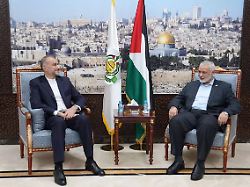Alliance for the fight against Israel
Hamas and Iran discuss “resistance axis”
October 15, 2023, 5:41 p.m
Since the Islamic Revolution of 1979, Israel has been Iran’s archenemy. Hamas also wants the destruction of the Jewish state. In Qatar, the Iranian foreign minister and the head of Hamas discuss the possibility of establishing an “axis of resistance.”
Iran and the Islamist Palestinian organization Hamas have discussed strengthening their resistance against Israel. At their meeting in the Qatari capital Doha, Iran’s Foreign Minister Hussein Amirabdollahian and Hamas boss Ismail Haniya discussed ways to strengthen the “axis of resistance” against Israel, reports the Iranian state agency Irna. This refers to an alliance of militant groups against the Jewish state.
Israel has been Iran’s archenemy since the Islamic Revolution of 1979. Since the 1990s, Tehran has massively expanded its political and military ties in the region in order to harm the country. The conversation in Doha with Hamas leader Hanija is said to have lasted three hours. A representative of the terrorist organization ruling the Gaza Strip, Chalil al-Haja, called for the destruction of Israel after the meeting.
The Iranian foreign minister traveled to Doha after meeting allies on visits to Iraq, Syria and Lebanon, including the secretary general of the Shiite organization Hezbollah, Hassan Nasrallah. The Gulf Emirate of Qatar has been one of Hamas’s most important supporters for around 15 years. Hamas leader Haniya lives in Qatar.
“We don’t want any escalation”
In Qatar, Iran’s Foreign Minister Amirabdollahian also met with the Emir of Qatar, Sheikh Tamim bin Hamad Al-Thani. Amirabdollahian then issued a strong warning to Israel against invading the Gaza Strip. If Israel continues its “attacks on the defenseless population of the Gaza Strip,” no one can guarantee that the conflict will not escalate, he said.
In view of the increasingly deteriorating situation, the Israeli defense minister emphasized that his country had no interest in a war with the Lebanese Hezbollah in the north, which, like Hamas, is supported by Iran. “We don’t want the situation to escalate,” said Joav Galant at a meeting with Israeli soldiers on the edge of the Gaza Strip. “But if Hezbollah chooses the path of war, it will pay a very high price.”
The pro-Iranian militia has also regularly fired rockets into Israel since Hamas’ terror attack a week ago. According to the Israeli military, nine rockets were fired at Israel from Lebanon on Sunday alone. The missile defense intercepted five projectiles, it is said. According to media reports, eight people in Israel were injured, some seriously. The Israeli army returned fire and attacked the launch sites in Lebanon. Rockets had previously been fired from Lebanon in the western border area.
Destruction of Hamas
Following Hamas’ major attack on October 7, Israel is currently preparing a large-scale ground offensive in the Palestinian territory. Tens of thousands of Israeli soldiers were massed on the border with the Gaza Strip and 1.1 million residents in the north of the Gaza Strip were asked to flee.
According to the army, the aim of an Israeli ground offensive in the Gaza Strip is to destroy the Hamas network so that the group can no longer organize attacks on Israel. Particular attention is being paid to Hamas military chief Jahja Sinwar, who is held by Israel to be the main organizer of the major attack on October 7th.
